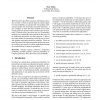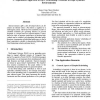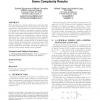2490 search results - page 2 / 498 » The Generalized Theory of Model Preference |
INFFUS
2006
13 years 4 months ago
2006
The bipolar view in preference modeling distinguishes between negative and positive preferences. Negative preferences correspond to what is rejected, considered unacceptable, whil...
ISIPTA
1999
IEEE
13 years 8 months ago
1999
IEEE
Belief functions, possibility measures and Choquet capacities of order 2, which are special kinds of coherent upper or lower probability, are amongst the most popular mathematical...
HICSS
2003
IEEE
13 years 9 months ago
2003
IEEE
Microeconomics offer a far developed theory on the subject of rational choice. This theory is applied to a multi-agent system, which has been modeled in order to establish schedul...
AI
2011
Springer
12 years 11 months ago
2011
Springer
In this paper we present a general framework for the comparison of intervals when preference relations have to established. The use of intervals in order to take into account impr...
ATAL
2005
Springer
13 years 10 months ago
2005
Springer
Many industrial or research activities are so expensive that it is often benefitable for the involved agents to cofund the construction or the purchase of a common required resou...



